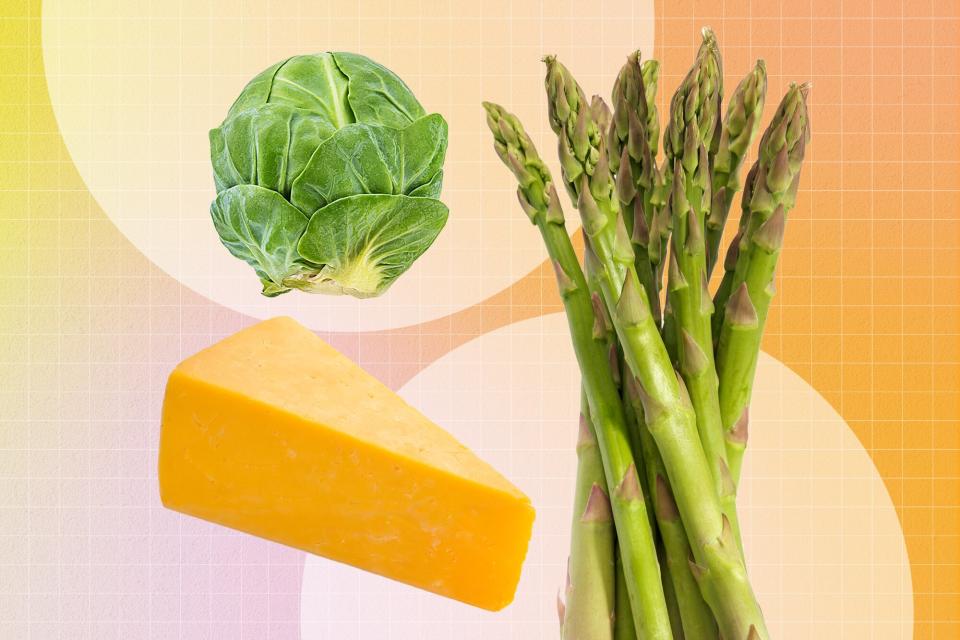Vitamin B12 and Folic Acid May Help Reverse Nonalcoholic Fatty Liver Disease, New Research Suggests—Here Are 4 Foods That Deliver Both
Despite what those Instagram ads or juice companies might lead you to believe, a healthy liver does a beautiful job of "cleansing" and "detoxing" itself.
That said, a surprising number—about 25% of U.S. adults, per the National Institute of Diabetes and Digestive and Kidney Diseases—actually have a condition in which their liver's function is impacted due to excess fat accumulation within it. Speaking of liver function, by the way, the liver aids in everything from breaking down the food we eat to converting extra blood sugar into glycogen (stored energy) we can use later and regulating blood levels of amino acids (protein building blocks) to clearing the blood of drugs and other poisonous things, according to experts at Johns Hopkins Medicine.
In generations past, alcohol abuse used to be the most common cause of fatty liver disease. But that surprising 1-in-4 stat refers to Americans with nonalcoholic fatty liver disease (NAFLD), a condition marked by a liver with 5% or more of its weight made up of fat. Over time, this can lead to life-threatening health challenges, such as cirrhosis and cancer, and it's the leading cause of liver transplants worldwide.
Related: What Is Fatty Liver Disease?
Another worrisome feature of NAFLD is that it's often a "silent disease," meaning it has few, if any, symptoms, the NIDDK confirms.
But the positive news is that we're learning that NAFLD can essentially go into remission if caught during its early stages—again, no cleanses or detoxes required. What you eat, including enough vitamin B12 and folic acid, can actually help reverse nonalcoholic fatty liver disease, according to a new study published in July 2022 in the Journal of Hepatology.

What This Liver Health Study Found
Since it's an early theory about NAFLD, researchers at Duke National University of Singapore, along with colleagues from Singapore, India, China and the U.S., tested their hypothesis for this study on mice.
More research is clearly needed among humans with NAFLD. Still, to kick things off, this team was curious to test if a condition called hyperhomocysteinemia, a metabolic disorder that causes a buildup of homocysteine within the liver, might be linked to the progression of NAFLD. According to MedlinePlus, homocysteine helps the body produce proteins. Since any cases of hyperhomocysteinemia are triggered by low dietary intake of folate or Vitamin B12, the scientists supplemented the diets of mice (attempting to feed them foods that might mimic the typical Western diet) with these two nutrients.
Related: A New Study Says Drinking This Much Coffee Each Day May Help Protect Your Liver from Chronic Disease
They found that these supplements slowed the progression of NAFLD and reversed liver inflammation and fibrosis (thickening of scar tissue, which may lead to cirrhosis).
"Our findings are both exciting and important because they suggest that a relatively inexpensive therapy, vitamin B12 and folic acid, could be used to prevent and/or delay the progression [of NAFLD]," Brijesh Singh, Ph.D., an assistant professor at Duke-NUS and study co-author, tells Duke-NUS Medical School News.
While this is a very initial finding, focusing on two nutrients as part of a diet rich in these best foods for the liver is certainly a lot easier and more affordable than an organ transplant.
"Currently, the only treatment for patients with end-stage liver disease is to receive a transplant. The findings … demonstrate that a simple, affordable and accessible intervention could potentially halt or reverse the damage to the liver, bringing new hope to those suffering from fatty liver diseases," Patrick Casey, Ph.D., senior vice-dean for research at Duke-NUS, adds to Duke-NUS Medical School News.
4 Foods High in Vitamin B12 and Folic Acid
Not sold on supplements? We get it! Here at EatingWell, we're firm believers in food first, then safe supplements (under the direction of your health care provider) to help fill in any gaps.
The NIH Office of Dietary Supplements guides on folate/folic acid and vitamin B12 validate that these foods and drinks are solid sources of both of the potentially NAFLD-reversing nutrients. We're listing them below based on their percentage of Daily Value.
3 ounces beef liver: 54% DV of folate; 2,944% DV of vitamin B12
1 serving fortified breakfast cereal: 25% DV of folate and vitamin B12
1 large egg: 6% DV of folate; 19% DV of vitamin B12
1 cup milk: 3% DV of folate; 54% DV of vitamin B12
You can also find folate in large amounts in:
Spinach
Black-eyed peas
White rice
Asparagus
Brussels sprouts
Enriched spaghetti
Romaine lettuce
And vitamin B12 in:
Clams
Bluefin tuna
Fortified nutritional yeast
Atlantic salmon
Ground beef
Yogurt
Cheddar cheese
Beyond these nutrient-rich foods, earlier studies suggest that drinking three 6-ounce cups of coffee per day, trading whole grains for refined ones, racking up enough exercise and eating more cruciferous veggies (including Brussels sprouts, bok choy, cabbage and broccoli) also go a long way to help keep your liver healthy.
The Bottom Line
This new study hints that two nutrients, folate and vitamin B12, might be especially beneficial to help support liver health and potentially reverse nonalcoholic fatty liver disease. Much more research is needed to confirm these findings. Until we know more, though, it certainly can't hurt to fill your plate with more foods that offer these nutrients. To do just that, consider adding these delicious Gochujang-Glazed Salmon with Garlic Spinach and Spaghetti with Quick Meat Sauce recipes to your menu this week.

